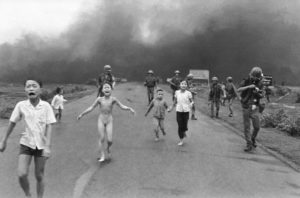
The Big Push
By John Glenday
after Sir Herbert James Gunn ‘The Eve of the Battle of the Somme’
Would you believe it, there’s a bloke out there singing
‘When You Come to the End of a Perfect Day’.
His audience, a sixty-pounder crew, stand round bleeding
from the ears. The Boche are all but finished, apparently –
I heard they’re packing old clock parts into trench mortars
now, for want of iron scrap. Some wag quips that next time he’s
sentry and hears the plop of a minnenwerfer tumbling over,
he’ll not blow the alarm, he’ll shout: ‘Time, gentlemen, please…’
We laugh and for one heartbeat forget to be afraid. Bravery
and cowardice are just two workings of the same fear
moving us in different ways. The 8th East Surreys
have been given footballs to kick and follow at Zero Hour;
it’s to persuade them from the trenches lest their nerve fail
as they advance on Montaubon. I’ve watched men
hitch up their collars and trudge forward as if shrapnel
and lead were no worse than a shower of winter rain.
This afternoon a few of us went swimming in the mill dam
behind Camp. Just for a while to have no weight, to go drifting
clear of thought and world, was utter bliss. A skylark climbed
high over the torn fields on its impossible thread of song:
“like an unbodied joy.” I don’t know why, but it reminded
me of the day we took over from the French along the Somme;
it was so tranquil, so picturesque, the German trenchworks crowded
with swathes of tiny, brilliant flowers none of us could name.
I believe if the dead come back at all they’ll come back green
to grow from the broken earth and drink the gathered water
and all the things they suffered will mean no more to them
than the setting-in of the ordinary dark, or a change of weather.

War Photograph
by Kate Daniels
A naked child is running
along the path toward us,
her arms stretched out,
her mouth open,
the world turned to trash
behind her.
She is running from the smoke
and the soldiers, from the bodies
of her mother and little sister
thrown down into a ditch,
from the blown-up bamboo hut
from the melted pots and pans.
And she is also running from the gods
who have changed the sky to fire
and puddled the earth with skin and blood.
She is running—my god—to us,
10,000 miles away,
reading the caption
beneath her picture
in a weekly magazine.
All over the country
we’re feeling sorry for her
and being appalled at the war
being fought in the other world.
She keeps on running, you know,
after the shutter of the camera
clicks. She’s running to us.
For how can she know,
her feet beating a path
on another continent?
How can she know
what we really are?
From the distance, we look
so terribly human.

Excerpt from Eyes Right: Confessions from a Woman Marine
By Tracy Crow
I was eleven the first time I fell in love with a general.
On a Thursday night in 1970, a night when my brother was in the hospital recovering from a hernia operation and my mother staying the night with him, my father took me to see the movie he said everyone was talking about.
Here’s how I remember it. George C. Scott as General Patton in army uniform steps onto the stage. Salutes. In the background, an enormous American flag. We are watching him hold the salute through a trumpet call for reveille. The camera cuts to a pearl-handled pistol, the helmet with four stars, a baton, rows of medals, that pinky ring. My father’s munching popcorn, drinking a Coke.
Patton, or rather Scott as Patton, is addressing a class of recruits who would soon leave to join the fight against the Nazis. We never see the recruits, but sitting there in the dark theater next to my father, I felt strangely like one of them: the good girl who followed the rules to keep from sparking war within her family.
At the beginning of Patton, Scott delivers his famous monologue about sacrifice and bravery. My father was shaking the tub of popcorn at me and as I reached for another buttery handful, on the screen, General Patton began swearing in that voice that reminded me of tires grinding along a gravel driveway, and I pulled my hand back … You win a war by letting some other poor bastard die for his country … When the general finished, I reached for more popcorn and glanced up at my father. Underneath the fragments of moving shadows that played across his face was an odd and unfamiliar expression. I suddenly had the feeling I was sitting next to a stranger, helping myself to his popcorn.
What about war and killing and sacrifice and honor among men did my father wish to share with me? In the dark theater that night watching Patton, my father felt too far away from the life that included my mother, brother, and me. He had locked himself into a private chamber within his mind. What was he learning there? What was he questioning? Under life’s most difficult conditions, would I? Could I? What, retreat? Desert? Hold your ground? Be brave? Jump on the grenade to save the others?
Or, maybe I’m wrong. Maybe all these thoughts were only firing into me.
